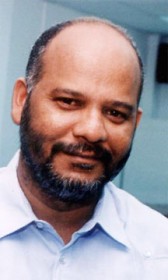A workshop to discuss government’s anti-terrorism initiatives was held yesterday and Minister of Home Affairs Clement Rohee said that Guyana is in the process of drafting an Anti-Terrorism Bill.

The Ministry in collaboration with the United Nations Office on Drugs and Crime (UNODC) held the one-day workshop at the Regency Suites Hotel and participants were drawn from several government agencies, including the police and army. The objective of the workshop was to provide Guyana with assistance in incorporating the UN Anti-Terrorism instruments into its domestic laws, as part of the global legal framework against terrorism.
Three officials from the UNODC facilitated the workshop sessions, a statement from the Ministry of Home Affairs said. According to the statement, Herman Longo of the UNODC, in his brief remarks at the opening of the ceremony, thanked government for facilitating the workshop. Rohee, in his feature address welcomed the collaboration between the Government of Guyana and the UNODC, in particular in the area of the technical assistance being provided to Guyana, to aid it in combating terrorism at the national level.
He cautioned participants against viewing terrorism only as an “international” issue, the statement said adding that he disclosed that Guyana has ratified 12 of the 16 United Nations instruments against terrorism, and that Guyana was in the process of drafting an Anti-Terrorism Bill.
Topics covered during the workshop included: the Global Legal Framework Against Terrorism; International Cooperation in Criminal Matters; Technical Assistance provided by the UNODC and the UN Security Council Resolution 1373 – requirements for implementation.
At the conclusion of the workshop, the Director-General of the Ministry of Foreign Affairs Elizabeth Harper noted that the workshop was timely, especially since the world was reflecting on the 9/11 attacks in the United States. She expressed appreciation to the UNODC for its continued support to the Government of Guyana, the statement said.
This year, Guyanese Abdul Kadir and Guyana-born US citizen Russell Defreitas went to trial and were convicted for their involvement in the JFK terror plot. In addition, the US named Guyanese Adnan el-Shukrijumah as the head of al-Qaeda operations. He was once spotted in Guyana.
Kadir, 58, served as a PNCR MP in the eighth Parliament of Guyana from 2002 to 2006. He is also a former mayor of Linden. He was arrested in June 2007 on a plane in Trinidad on his way to Iran.
Defreitas, 67, who had reportedly boasted of being the mastermind of the plot, was once employed as a cargo handler at the JFK airport. Two other men, Abdel Nur and Donald Nero, have pleaded guilty to participating in the plot while another man, Kareem Ibrahim, is still awaiting trial. The plot to blow up the airport was hatched in January 2006, and reportedly involved blowing up jet fuel tanks leading to the airport.
AFC leader Raphael Trotman has said that based on the convictions, scrutiny of Guyana would intensify.
It is believed that it was El Shukrijumah’s reported presence in Guyana that propelled US authorities to send star witness Stephen Francis to Guyana in an attempt to lure the elusive terrorist into the trap of plotting to blow up the JFK airport. Instead, Francis met Kadir, Abdul Nur and later Ibrahim. Francis visited Guyana in the company of Defreitas.
Reports are that while he was in Guyana, El Shukrijumah was once safe and secure under the protection of Swiss House Cambio boss Farouk Razac, who died in May 2007 under mysterious circumstances at his home. According to reports, El Shukrijumah was spotted at the Swiss House Cambio by several witnesses, including self-proclaimed death squad informant George Bacchus. Bacchus himself was gunned down in 2006 following his many public statements about the existence and operation of a death squad.
It was at the cambio that El Shukrijumah reportedly met one of Razac’s closest clients, Imam Muhammed Hassan Abrahemi, the director of the International Islamic College for Advanced Studies, a small Shiite school in Georgetown that received large amounts of revenue from the government of Iran.
It was there he also allegedly became acquainted with Nur, who ran errands for Razac and Kadir, who served as the assistant director at Abrahemi’s Islamic College.
Abrahemi was kidnapped by two masked men as he was leaving the Islamic College on April 2, 2004 and many days later his body was discovered in a shallow grave on the outskirts of Georgetown.









